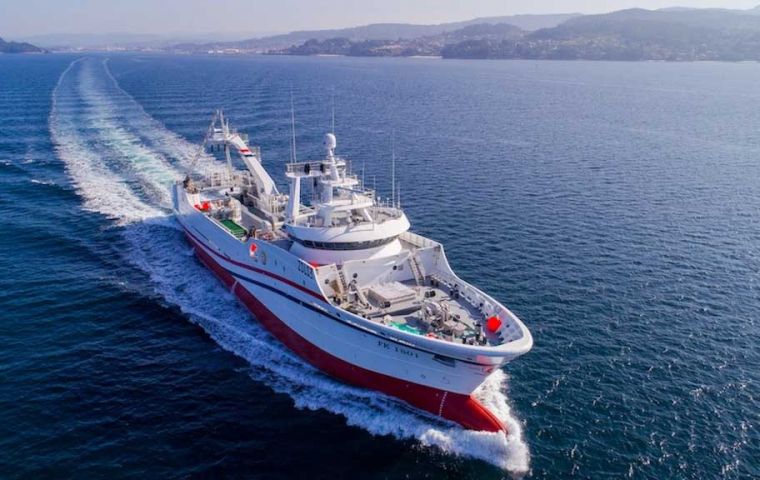MercoPress. South Atlantic News Agency
Galician Fleet Sets Sail for Falklands with Cautious Optimism Amid Loligo Squid Uncertainty
 Modern factory trawler 'Argos Cies' (IMO: 9818644) operating in JV under the flag of the 'Falkland Islands'.
Modern factory trawler 'Argos Cies' (IMO: 9818644) operating in JV under the flag of the 'Falkland Islands'. Despite sharp declines in recent seasons and unanswered questions about stock migration, nearly 1,000 crew members embark on a crucial four-month campaign vital to the region's economy.
Vigo/Marín – The Galician fishing fleet bound for the Falkland Islands, comprising sixteen large freezer trawlers and nearly 1,000 crew members, departed this past week from the ports of Vigo and Marín, Spain. Their destination is the distant Falkland Islands, where they anticipate spending up to four months targeting Loligo squid, a crucial resource whose biomass has shown worrying irregularity in recent years. Despite the biological uncertainty, shipowners maintain high expectations for this new campaign, as reported by Luis Carlos Llera of La Voz de Galicia.
The departure of the vessels, which finalized their preparations last month, occurs in a context of continued decline in catches both in the waters adjacent to the Falkland Islands and in the strip outside the 200-mile limit of Argentina's Exclusive Economic Zone (ZEEA). In the first months of the year, catches barely reached 20 tonnes per day, far below the 45 tonnes achieved in previous seasons and even distant from the 75 tonnes recorded in peak periods. In fact, the first season of 2025 concluded 10 days earlier than planned, with a 21% reduction in catches compared to the previous year, and the second season of 2024 was cancelled entirely.
Despite this outlook, shipowning companies remain moderately optimistic, betting on a gradual recovery in catches during this new season. The actual state of the biomass in the fishing grounds around the Falkland Islands remains uncertain due to the highly variable nature of the squid population, making a precise assessment impossible until the vessels begin their initial prospecting.
The Galician fleet operates 16 Falkland Islands-flagged vessels in JVs and another 24 Spanish-flagged trawlers. The latter vary in number depending on the year, and some pay a license to fish within the Falkland Islands EEZ (to the FIG government), while others theoretically fish in international waters. The map of the area shows the location of the Spanish fleet's main fishing grounds along the Patagonian Shelf, as well as the boundaries of the Falkland Islands Conservation Zones. MN = North Falkland Islands; MW = West Falkland Islands; MS = South Falkland Islands; FICZ = Falkland Islands Interim Conservation Zone; FOCZ = Falkland Islands Outer Conservation Zone.
Causes of Decline: Hypotheses Under Debate
The persistent declines in catches have led to various hypotheses among marine biologists and experts. Some attribute it to a sustained increase in the average ocean temperature in the region, higher than the historical average. Others, from a more conservationist perspective, suggest it could be a direct consequence of overfishing at these latitudes, driven by the intense activity of large factory ships operating in the area with high levels of fishing effort.
A particularly disturbing phenomenon adds to this complex scenario: for several years now, the traditional migration of cephalopods from Argentina's territorial sea (specifically from the continental shelf of Tierra del Fuego and southern Santa Cruz) has abruptly ceased. Some analysts speculate that the constant seismic bombardment associated with hydrocarbon and gas exploration in that Fuegian and Santa Cruz basin could have caused significant damage to the larval and juvenile stages of the squid, severely affecting its biological cycle. However, all these hypotheses remain speculative, as there is currently no conclusive scientific evidence to clarify the real cause of the phenomenon. The only undisputed fact is the current absence of this squid stock, which, until recently, constituted a key resource for the region.
Cutting-Edge Fleet at Sea and Market Challenges
The Prión, Pescapuerta's flagship vessel, has already departed for the fishing grounds and will be the first to gather data in the area. Other notable vessels already heading to the Falklands include the Monte Lourido, Hadassa Bay, Monteferro, Argos Cies, Argos Berbes, Argos Pereira, New Polar, Sil, Robin M Lee, Beagle F1, and Venturer.
The modernized fleet incorporates state-of-the-art units such as the Argos Berbés (belonging to Armadora Pereira), the Prión (from Pescapuerta), and the Hadassa Bay (operated by Copemar). These modern vessels, along with others recently updated by companies like Rampesca, Moradiña, or Marfrío, integrate cutting-edge technology for fishing and processing operations, as well as for improving onboard living conditions.
Furthermore, the trawlers Venturer and Falcon, operated by the Falkland Islands company Petrel Fishing (part-owned by Vigo-based Pescapuerta and its local partner Fortuna Ltd.), have received their respective crews and are preparing to join the campaign. These vessels add to the contingent of 14 other ships linked to Galician shipowners, who participate year after year in the squid fishery in South Atlantic waters.
In terms of the market, the commercial situation also reflects contrasts. According to brokers specializing in cephalopod trading, smaller squid have selective demand, while larger sizes stand out due to vigorous demand from Southeast Asia, accompanied by very firm prices, a consistent trend throughout the year.
The economic relevance of this fishery is equally notable for the Falkland Islands, where it represents approximately 60% of their Gross Domestic Product, exceeding £278 million sterling. The activity of the Galician vessels in the region generates significant revenue through licenses—valued at around one million euros per vessel—and logistics services.
Source : Fish Information & Services


Top Comments
Disclaimer & comment rulesCommenting for this story is now closed.
If you have a Facebook account, become a fan and comment on our Facebook Page!